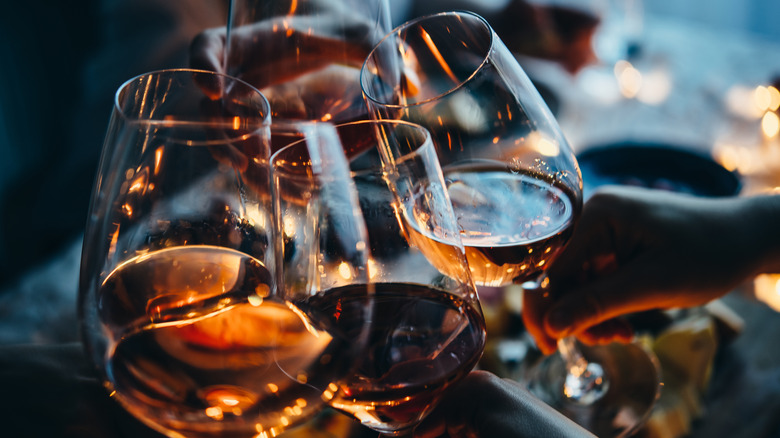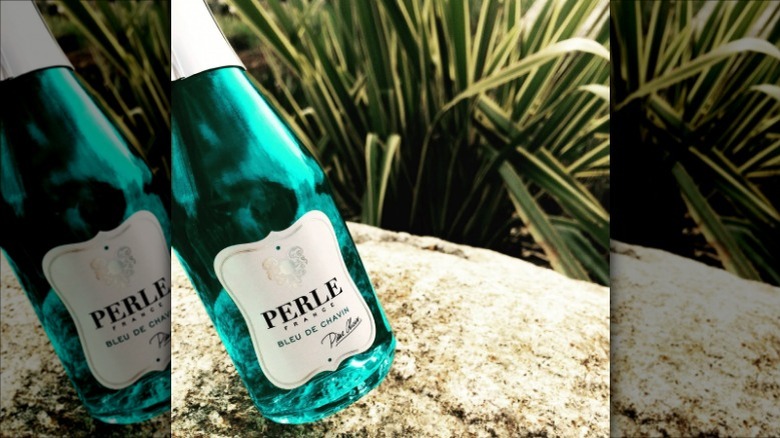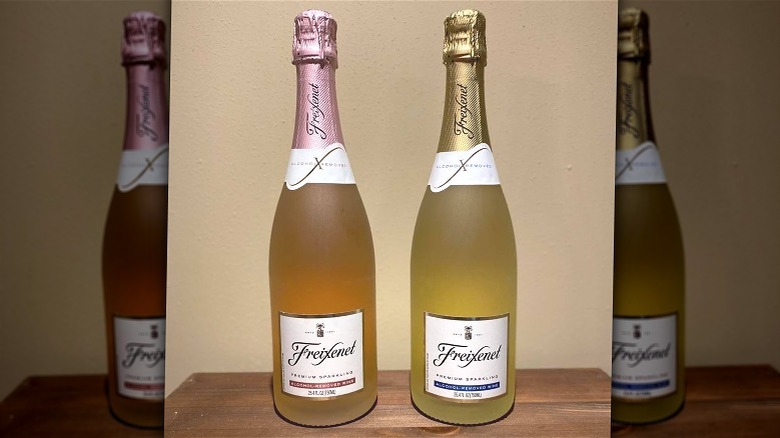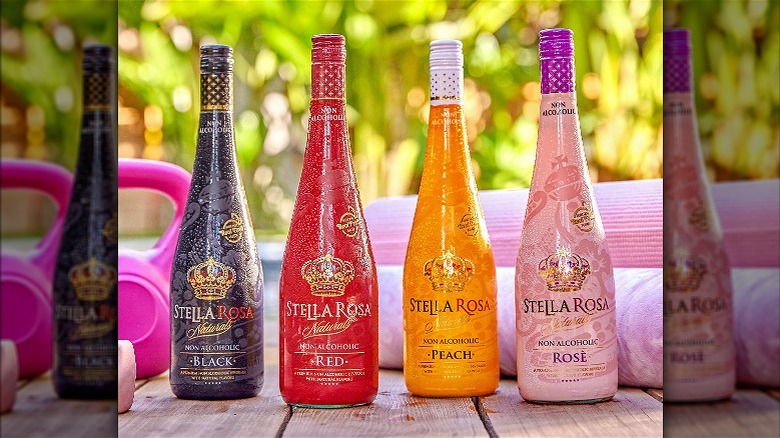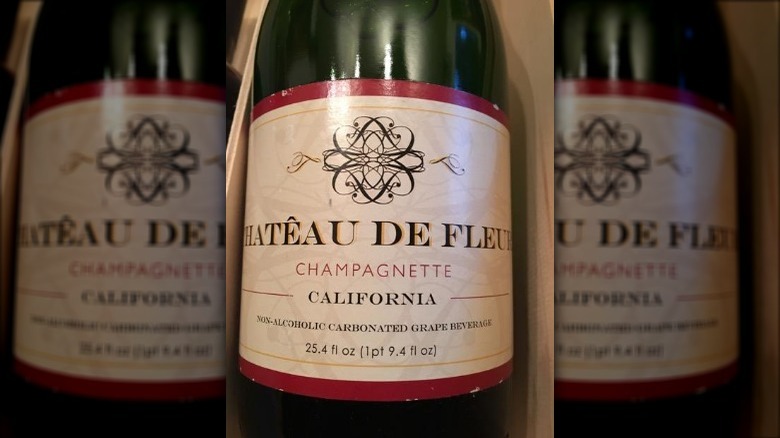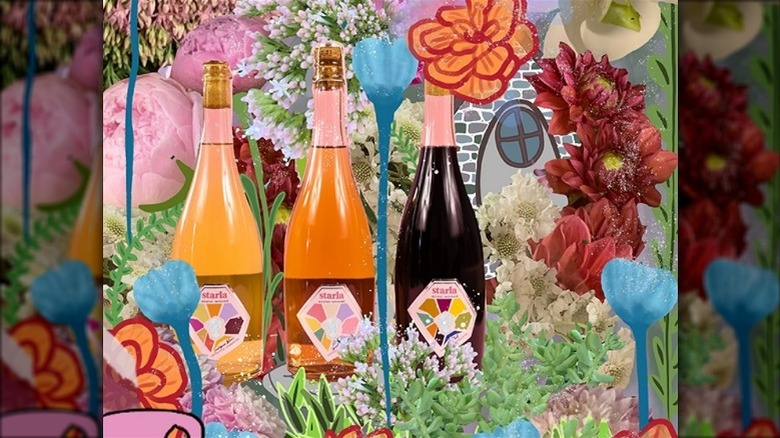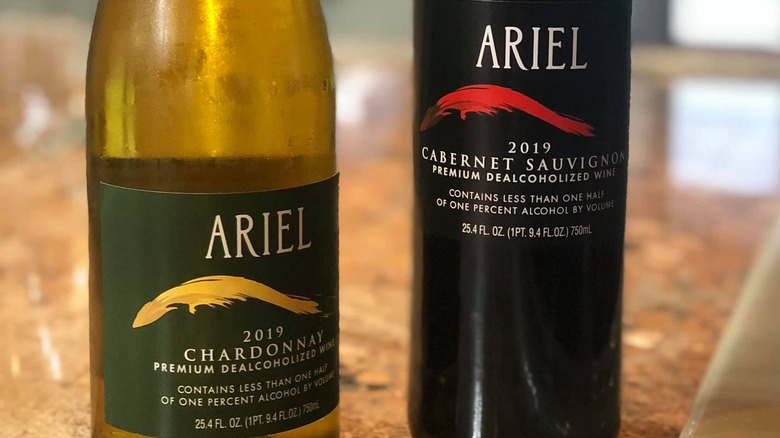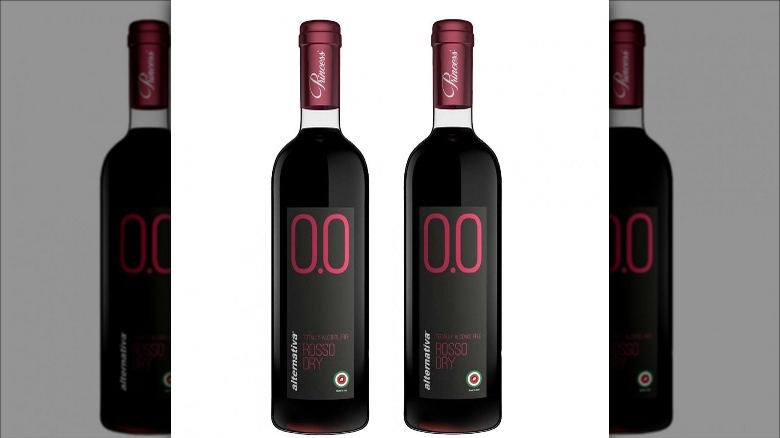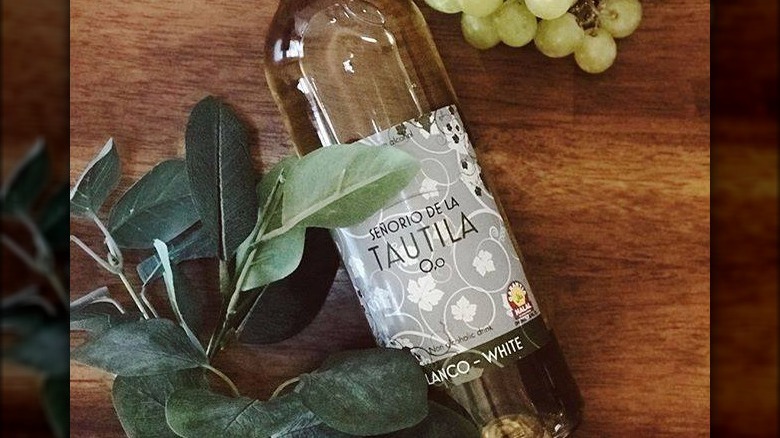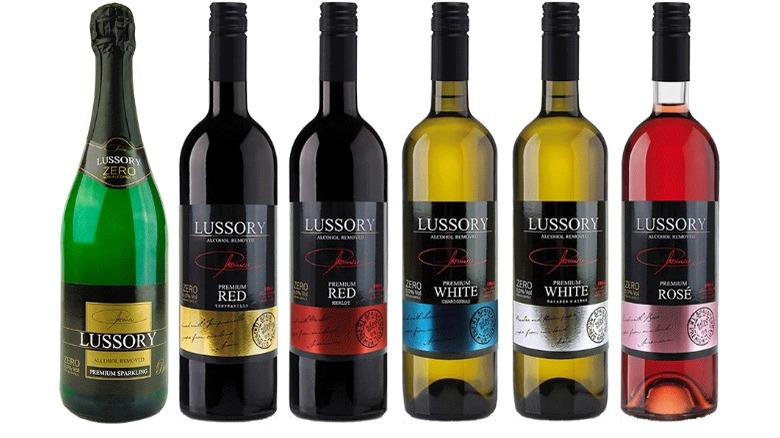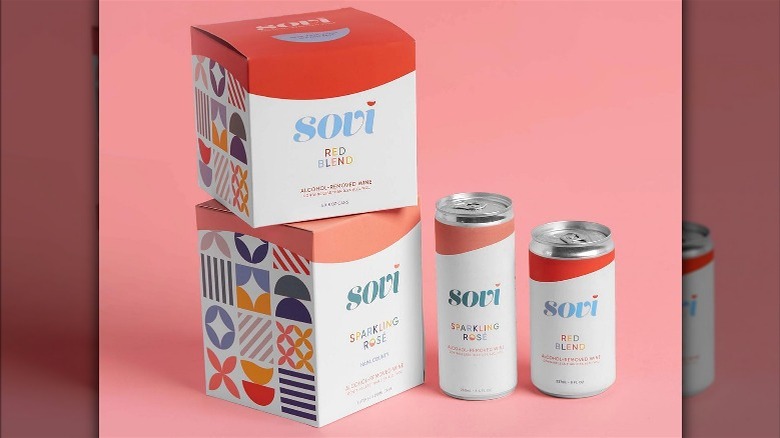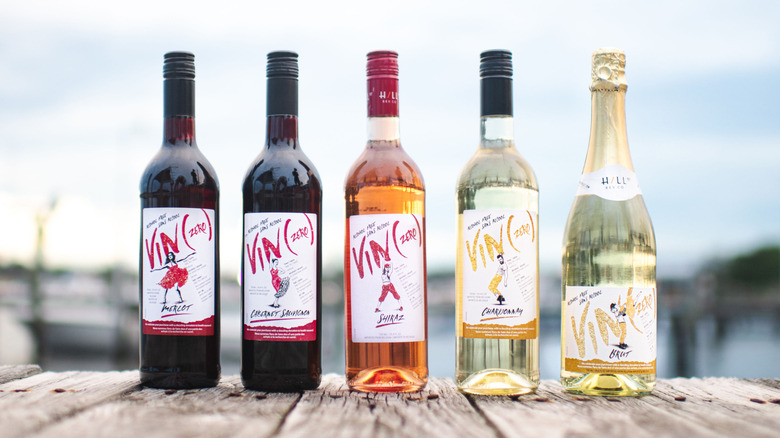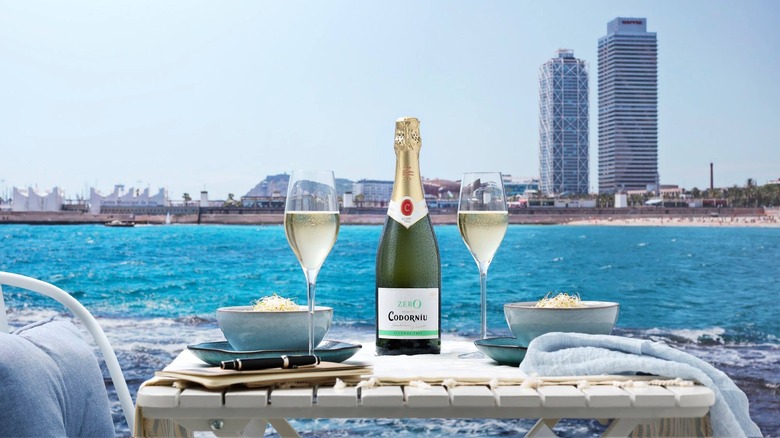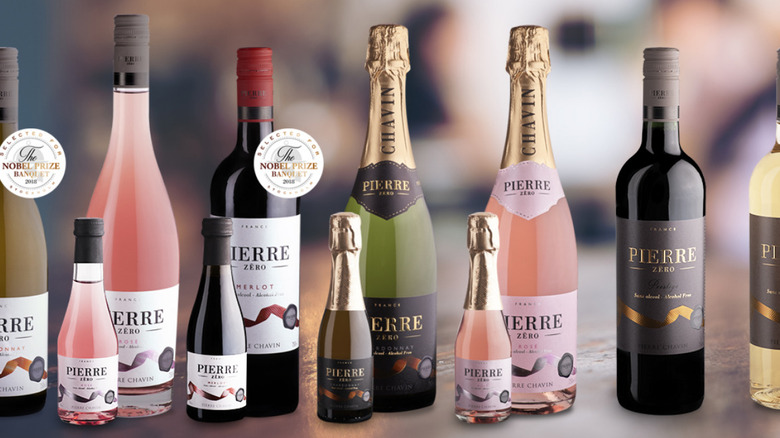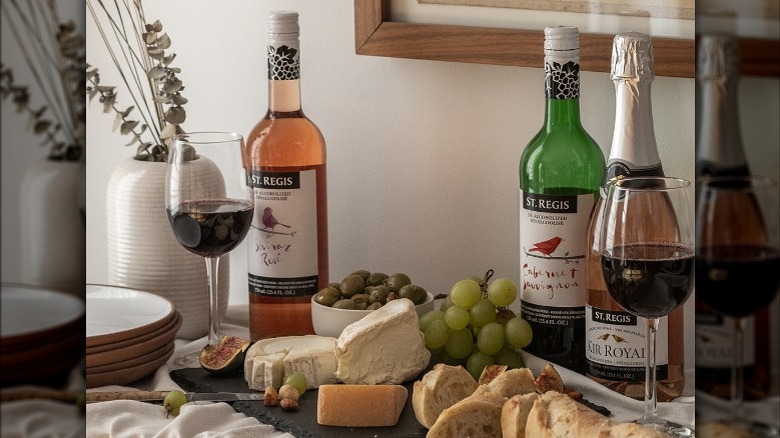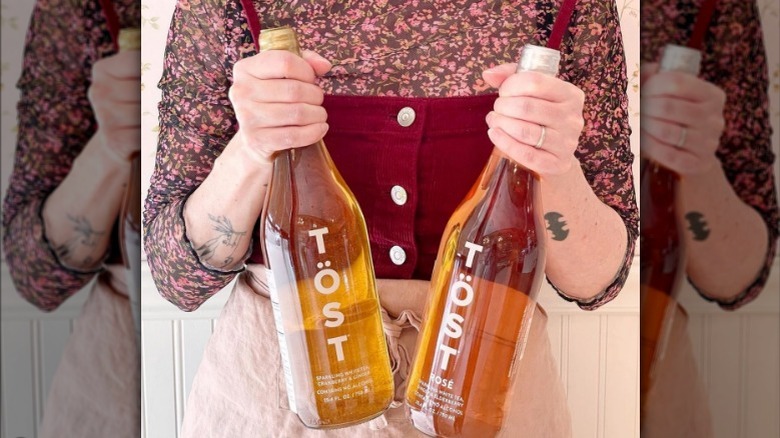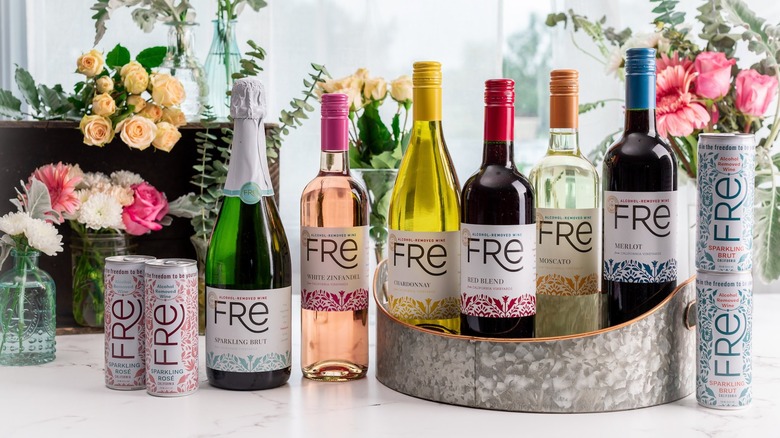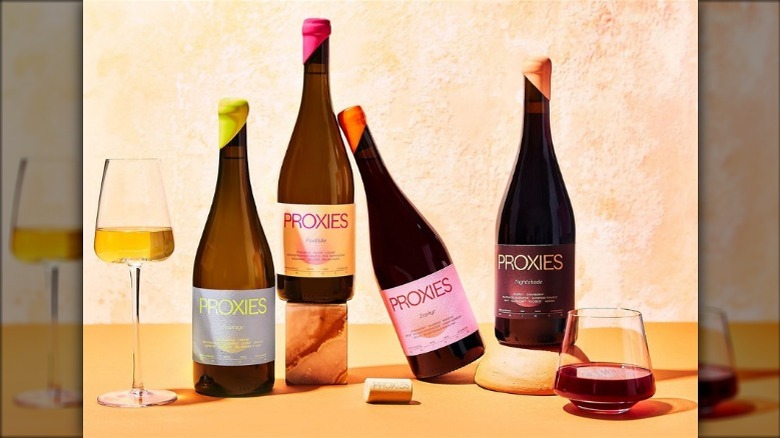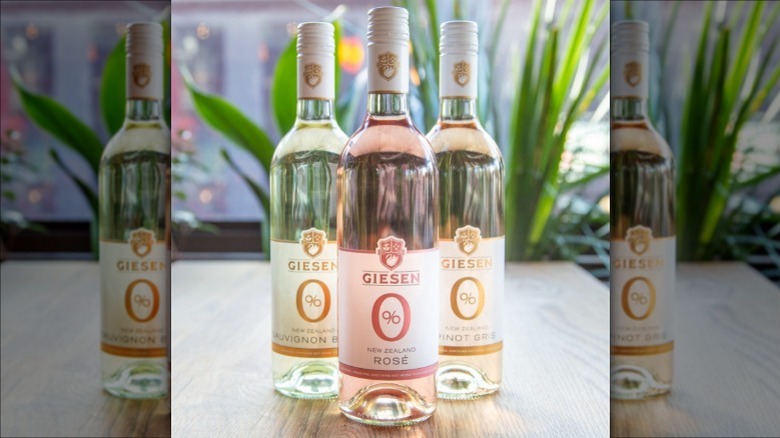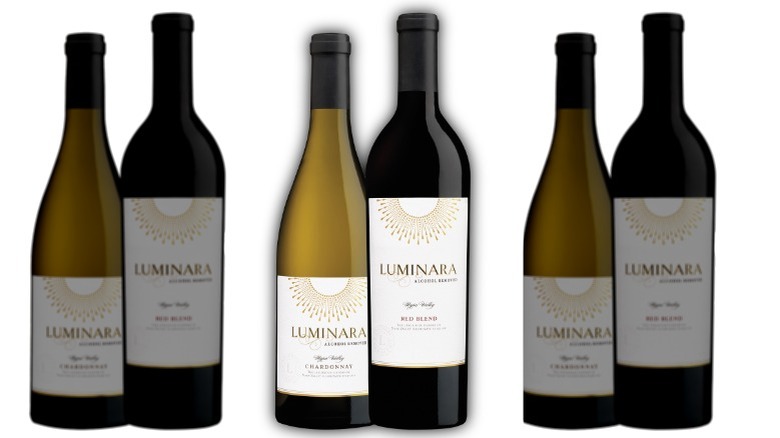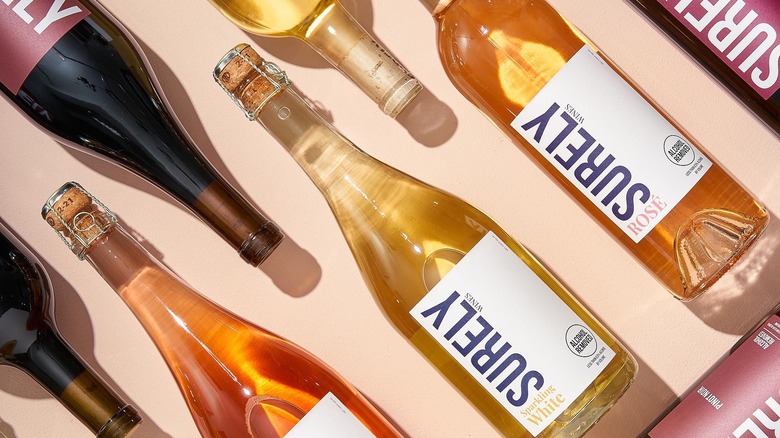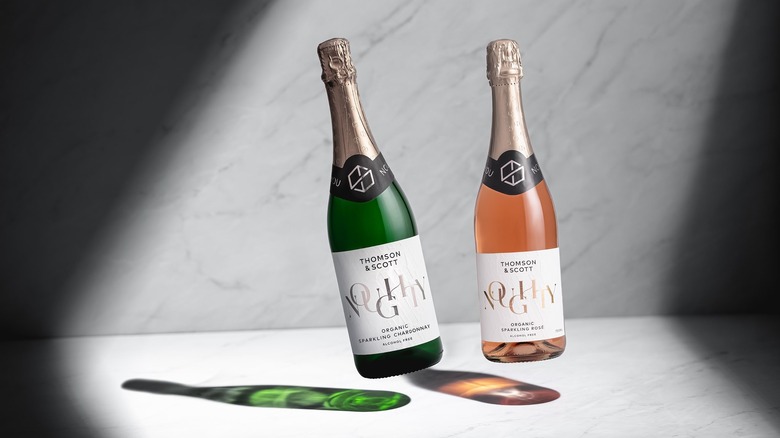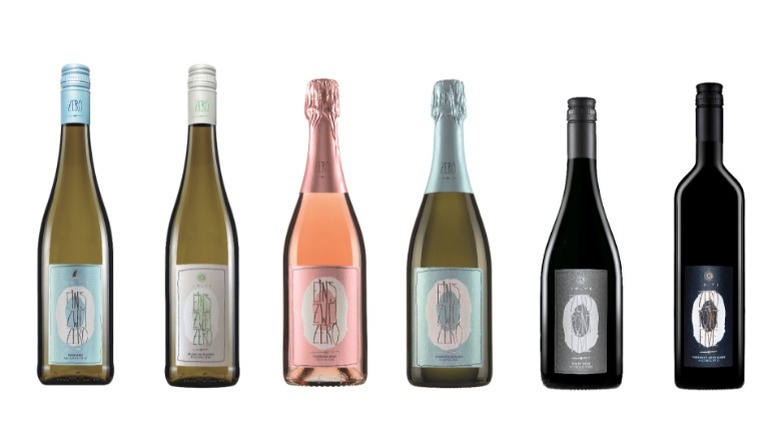23 Non-Alcoholic Wine Brands, Ranked From Worst To Best
We may receive a commission on purchases made from links.
There are plenty of reasons why someone might be interested in sipping a non-alcoholic wine, and there have never been more non-alcoholic wine options on the market than there are right now. If you don't have much experience with alcohol-free wines, you may be wondering which wine to choose and if it'll taste anything like traditional wine. It can be overwhelming navigating the wine world as it is, even before throwing a booze-free curveball. Fear not, we're here to lead you to the wine that'll pair best with a good time, however you want to spend it.
But first, what is non-alcoholic wine? In a nutshell, there are three types of non-alcoholic wine. The first is basically just grape juice (or another fruit juice) that's never been fermented (think Welch's or Martinelli's). While these beverages are easy to find, most winemakers and purveyors don't actually consider them wine. The next type of alcohol-free wine is made by vacuum distillation, where wine is heated just to the point that the alcohol is burned off, leaving 0.5% or less alcohol by volume (ABV). The final way non-alcoholic wine is made is by reverse osmosis, which preserves many of the aromas and flavors of the wine by separating them into a "wine concentrate" before filtering out the ethanol, which is impressive, but also expensive and resource-intensive (via Wine Folly).
With that in mind, here's a look at 23 of the most popular non-alcoholic wines on the market, and how they rank.
23. Pierre Chavin Perle
Perle is the first of two non-alcoholic wine offerings on this list from French producer Pierre Chavin. There are four sparkling beverages in the collection, and include a white, rosé, and oddly enough, a blue wine. All three of the wines appear to be made of chardonnay, and simply dyed the appointed color.
Little information is given on how this wine is actually produced or why it costs an alarming $30 or more per bottle. But one thing is for certain — this wine and its pink and blue hues were created to tap directly into the baby shower and gender reveal market. BeClink claims that the Perle Bleu has hints of blueberry, while the Perle Rose has hints of "roses and other flowers," but we aren't really convinced. Ultimately, this over-priced juice beverage seems like a well-conceived way to use spectacle to get people to part with their money.
22. Freixenet
If you're a fan of bubbly wines, you've likely come across Mionetto prosecco. With its bold orange label and foil, and very approachable price point, it's hard to miss. Freixenet, which produces a wide variety of sparkling wines, is the other half of the Mionetto brand in the U.S. Freixenet is originally a Spanish cava brand that has expanded to include "alcohol-removed sparkling wines," which are available in white and rosé. These wines are dealcoholized by vacuum distillation at 40°C, and no specific variety of grape is given.
Alcohol Change UK writes, "The most popular non-alcoholic drinks, across the board, seem to have a little something extra — a bit of fizz, a touch of spice — to provide some of those taste sensations we've got used to getting from alcohol." To that end, the Freixenet satisfies. It's got plenty of bubbles and a sharp, dry flavor that is reminiscent of a festive Champagne. If this is the only non-alcoholic sparkling wine option that your local store has available, go ahead and grab a bottle. But if you're looking for more satisfying bubbly options, read on for more suggestions. And if you're wondering how to actually pronounce "Freixenet," your guess is as good as ours.
21. Stella Rosa
Stella Rosa is known for its extensive collection of economically-priced semi-sparkling and sparkling wines that break out of the traditional framework of varietals. Here you won't find grape names like cabernet sauvignon or chardonnay, but identifiers like "Black," "Ruby Rosé Grapefruit," "Imperiale Orange Moscato," and "Stella Rosa Green Apple." While many in the wine industry might dismiss Stella Rosa as an inferior wine, the fact is that it's the number-one selling bottled wine in California and the number-one imported Italian wine in the U.S. — stats that can't be ignored by even the most serious wine critics (via Vinepair).
And Stella Rosa knows its audience well. On top of making highly drinkable wines that don't require a crash course from a certified sommelier, the brand has also released non-alcoholic versions of some of their most popular wines. Currently they offer non-alcoholic black, peach, red, and rosé wines, which can all be found for $10 or less, depending on where you shop.
20. Chateau de Fleur
Chateau De Fleur non-alcoholic sparkling wine is a low-cost and easily accessible Chapagnette alternative that has garnered surprisingly high reviews. It's fruity and bubbly and a step above sparkling grape juice that many claim is just as good as Champagne, and perfect for your next celebration. It's the only non-alcoholic offering from Weibel Family Winery, based in Lodi, California, which has consistently won awards for their fully-alcoholic wine offerings. Interestingly, across almost every platform, people seem to rave about Chateau De Fleur, from its 4.1 out of 5-star rating on Amazon to its multiple 5-star ratings at Napa Cabs.
Unfortunately, you're not going to find a lot of variety in the non-alcoholic wine world here, just the Champagnette. If that's all you're looking for, you're all set — but for those looking to branch out into a more complex world of non-alcoholic wines, you'll need to read a little further.
19. Starla
One look at these stylish iridescent bottles and you'll be ready to give Starla wines a chance — assuming you judge wines by their labels, which is a perfectly acceptable way to buy wine. The brand was launched in 2021 and currently offers three wines: a red blend, sauvignon blanc, and sparkling rosé. It markets itself with a fashionable retro designer, Los Angeles style. Most impressively, the red blend and sparkling rosé have an exceptionally low 5 calories per 5-ounce serving, while the sauvignon blanc has 20 calories. The female-owned wine brand leans heavily into the worlds of art and high fashion, and the bottles come with a premium price tag at $28 per bottle — in direct competition with their full-octane competitors.
But the designer price tag and rose-tinted marketing might be obscuring the actual drinkability of these non-alcoholic wines. The Chalk Report writes, "The nose [of the red blend] has tart red grape juice ... and some kind of Ribena-esque blackcurrant element. No hint of oak, no spices, or herbaceous elements. The palate ... is just that vile grape flavor." Harsh reviews for sure, but something to consider when spending so much per bottle. We wouldn't blame you if you still wanted to taste Starla for yourself, but keep in mind that you're likely paying a pink tax, and there are a lot of non-alcoholic wine options available these days that might be genuinely more satisfying.
18. Ariel
Ariel's non-alcoholic wines are some of the very first booze-free wines to make a splash on the wine scene. According to the Ariel website, it all took off when the Blanc wine was entered at the Los Angeles County Fair in 1986, and walked away with the Gold medal. At its inception, Non Alcoholic Wines Online began with Ariel Wines as its only product, and continued to grow from there. Since then, Ariel's non-alcoholic wines have competed and ranked in eight other competitions with alcohol-based wines.
Today Ariel offers two dealcoholized wines, a chardonnay and a cabernet sauvignon. Both wines remove the alcohol through the process of reverse osmosis, and contain less than 0.5% alcohol. "When you first open a bottle of Ariel Non-Alcoholic Red Wine, the aroma is ... well, interesting," the tasters at Yours write. "While it doesn't smell bad or off, it definitely doesn't have that red wine aroma we're used to." The reviewers note that Ariel's non-alcoholic cabernet does have the familiar black currant, dark chocolate, and dark cherry notes of a traditional California cab, as well as a dry finish.
Both the cabernet and chardonnay are less sweet than some competing non-alcoholic wines, most likely because water, rather than grape juice, is added back to the wine syrup after the reverse osmosis process. Both the chardonnay and cabernet sauvignon are reasonable priced at less that $10 a bottle.
17. Princess
Princess is an Italian non-alcoholic wine company that claims to make 0.0% alcohol wines. The most popular wines in the collection are the Rosso, Rosato, and Bianco, all dry wines, but the brand also produces a sweet sparkling bianco and a dry sparkling rosato. All of the wines are available online and come with mixed reviews.
Reviewers on BeClink have rated the Bianco Dry a 4 out of 5 stars, and 3 out of 5 stars for the Rosato Dry. "This is super light but it has that perfect little bit of sweetness that doesn't make it overpowering," one reviewer on Wines for Mothers writes of the Bianco Dry. "This is like the perfect wine to sip on after a hot day in the sun. Get it nice and chilled and slowly sip on it while sitting in a rocking chair! It is perfect!"
It's not entirely clear what kind of grapes are used for these wines, or how they're produced aside from being dealcoholized after production. Each bottle is roughly $20, which we think is fine price for a bottle we know we're going to love, but we think you can find better options for the price point and quality.
16. Señorío de la Tautila
Señorío de la Tautila is a lesser known brand producing non-alcoholic wines from Spain. While there aren't many non-alcoholic Spanish wines available in the U.S., Señorío de la Tautila is relatively easy to find online. The collection includes five wines, a sparkling rosé, rosé, sparkling white, and red all made from Tempranillo grapes, as well as a white made from airén grapes.
The red wine has garnered strong reviews on Wines for Mothers, with one reviewer writing, "This non-alcoholic wine has a nice smell, which gives it more of a feel of an alcohol-based wine. It is thinner than a true wine, but flavorful, and of course doesn't have the back of the throat bite of a true wine. It is one of my favorite [non-alcoholic] wines though."
If Spanish wine is your go-to, but you're looking for a non-alcoholic alternative, consider giving one of the Señorío de la Tautila wines a try. If they don't do it for you, there are also several cava options available that we've included on this list.
15. Lussory
Lussory is a Spanish brand that specializes in creating organic non-alcoholic wines, although not all of the wines the brand produces are actually organic. They've got an impressive collection that includes Tempranillo, merlot, airén, chardonnay, cabernet sauvignon, and brut wines, as well as organic versions of the merlot, chardonnay, and brut. Finally, they also produce a "24 karat gold" non-alcoholic sparkling white wine, which actually contains flecks of real gold (not unlike Goldschläger, but with even more gold flecks).
At $80 a pop, you're mostly paying for juice and drinkable gold flecks, which might be exactly what you're looking for if you want to indulge extravagantly without worrying about regretting it in the morning. Otherwise, the rest of the wines in the Lussory line are a more approachable $20-30. For an organic and non-alcoholic wine option, we like how easily accessible the Lussory wines are, although for the non-alcoholic and non-organic options, we think the price is a little steep.
14. Sovi
Sovi is leaving the bottles behind in favor of canned wines, which also happen to be non-alcoholic. Both are pretty new trends in the winemaking world, with both canned wines and non-alcoholic wines only recently coming into markets of their own. But these little cans are ready to go everywhere that glass can't, like the beach or hiking or even just across town. The wines themselves are grown and produced in California, then dealcoholized by vacuum distillation. No additional sugar or flavors are added to the wines, only the most authentic wine flavor possible for a non-alcoholic wine. The red blend is available in 8-ounce cans and the sparkling rosé comes in 8.4-ounce cans.
Drinkhacker tasted both the red blend and the sparkling rosé wines, giving them a B+ and C+ rating, respectively. "Full of ripe cherry and vanilla, it's medium-bodied with baking spices emerging towards the finish. It's well-rounded and improves with time in the glass, both of which are a bit surprising," they write of the red blend.
While we look forward to trying the canned red blend, there are a lot of non-alcoholic sparkling rosés on the market that have garnered better reviews, and might be worth trying instead.
13. Hill Street Beverages Vin(Zero)
Hill Street Beverages is a Canadian company that produces both non-alcoholic wines and beers, and makes cannabis-infused beverages as well. The collection of wines currently includes five options that many other non-alcoholic winemakers currently offer, including a merlot, chardonnay, sparkling brut blanc, shiraz rosé, and cabernet sauvignon. The wines are called Vin(Zero) and each have a different style of dancer, vaguely reminiscent of the grape origin, on the label. While not much information is given on how Hill Street dealcoholizes the wines, the website mentions a "proprietary process to remove alcohol."
This particular brand can sometimes be a little more difficult to lay your hands on here in the states, but can be found for a reasonable price through specialty importers like Better Rhodoes and Boisson, although prices vary widely from one retailer to another. The description of the merlot from Boisson reads, "[E]ven if you're not a big fan of Merlot, I would still suggest this wine, simply because its so drinkable. It's intensely red, like the juice squeezed out of a blackberry on to vanilla ice cream. It's kinda got this curranty thing going on too, but more blackberry, maybe some blueberries in there." That sounds pretty juicy and luscious to us. For red wine lovers looking for a non-alcoholic option, these are worth a try if you happen to come across a bottle.
12. Codorniu Zero
Codorníu is basically synonymous with cava, as it's the oldest and second largest cava producer in all of Spain, which is saying a lot. One look at the Codorníu website will have you fantasizing about running away to Sant Sadurní d'Anoia, which is about a 45 minute drive west of Barcelona. After 450 years and 18 generations of wine making, the company has launched an alcohol-free cava under the name "Codorníu Zero." It's available in a white brut and sparkling rosé, both with very high rankings at Total Wine.
The tasters at Soberito gave us an idea how the non-alcoholic cava stands up to the more traditional varieties. "[Y]ou immediately notice that it is rather dark, actually slightly darker yellow than you would expect from a Cava," Soberito writes. They also note that the bubbles are a little larger than the ultrafine bubbles found in traditional cava. "You clearly taste some apple, melon, apricot and some honey," but the taste isn't too sweet without the alcohol to balance it. Given how popular the Codorníu brand is, you're likely to find it wherever non-alcoholic wines are sold near you.
11. Pierre Zero
Pierre Zero, produced by French wine producer Pierre Chavin, claims to make a 100% completely non-alcoholic wine from traditionally fermented wine. The winemakers employ the same spinning cone vacuum distillation technology that many of the other dealcoholized winemakers employ, but with the expressed goal of making the wines a true 0.0% ABV as opposed to the industry accepted 0.5% ABV maximum. The collection includes seven wines: a merlot, chardonnay, rosé, sparkling chardonnay, sparkling rosé, and a "Prestige" white (chardonnay) and red (merlot). Most notably, the Pierre Zero merlot and chardonnay were chosen to be served at the Nobel Prize banquet in 2018.
The Grape Explorer on YouTube tasted the Pierre Zero merlot, and found it to be light in color but very drinkable, with grape and red fruit flavors. He also describes the wine as only slightly sweet and ultimately very dry, with just a small hit of acidity. The Pierre Zero chardonnay has a healthy 3.4 stars on Vivino, and Opening the Bottle gave both of the sparkling wines high marks.
Prices for the Pierre Zero wines vary based on where they are purchased, but they are worth trying if you come across them at a good price.
10. St. Regis
St. Regis is a relatively popular and easy-to-find French-Canadian brand of non-alcoholic wine with a small but solid selection to choose from. The brand offers a chardonnay, cabernet sauvignon, brut, shiraz rosé, and "Secco" (prosecco), as well as two pre-mixed bubbly cocktail options that include a spritz and Kir Royale. The highest-rated wines of the bunch seem to be the brut, chardonnay, and cabernet sauvignon. Like many of the other de-alcoholized wines on this list, the wines are fermented and produced traditionally, then undergo vacuum distillation to achieve the final non-alcoholic product. We're especially into the extensive collection of wine mocktails that St. Regis has whipped up and published on their website, which make the prospect of drinking a booze-free mixed drink even more appetizing.
When tasting the St. Regis cabernet sauvignon, LO2NO writes, "Right away, the aroma of this wine is remarkable in that it doesn't give away that there is no alcohol present. It is rich and complex, with a variety of elements to sort through," which is a great start. "While the aroma and the flavor profile don't exactly match, [the cabernet and chardonnay] are both rich and complex and bring different things to the table."
Not only will the St. Regis wines satisfy those looking for a non-alcoholic option, but they might also intrigue some who are still enjoying alcoholic wines as well. We're hoping St. Regis expands their line of wines, as well as their reach into the U.S. market.
9. TÖST
TÖST is a little bit of a departure from some of the other non-alcoholic wines available on the market. Instead of a traditional grape base like most of the other non-alcoholic wines use, TÖST is actually a sparkling white tea. The original TÖST is infused with white cranberry and ginger, while the rosé is infused with ginger and elderberry. Both are available in 750 ml size as well as packs of 250 ml bottles. Marketed as an inclusive drink that can be served in lieu of Champagne or boozy drinks at your next gathering, the drink is clearly trying to appeal to an adventurous and culinarily-inclined millennial crowd. When purchased through the site in bulk, the bottles only cost about $9 each, which is also pretty great. But how does it taste next to the rest of the competition on this list?
The New York Times writes, "Effervescent and crisp but not too sweet, TÖST is the ideal bubbly to celebrate with when you want a delicious drink minus the alcohol. Slightly gingery and with a hint of orange, it's as good as any high-quality Champagne."
So if you're looking to keep it light and refreshing with an untraditional contemporary vibe, you might want to pick up a bottle to try. If you're looking for something that more closely resembles the wines you're familiar with, or anything in the red wine arena, you're probably not going to find it here.
8. Fre Wines
Even if you aren't familiar with non-alcoholic wines, there's a good chance you've come across an advertisement or bottle of Fre wine somewhere. Fre currently offers nine different types of non-alcoholic wine, including sparkling brut, sparkling rosé, chardonnay, moscato, rosé, white zinfandel, merlot, cabernet sauvignon, and a red blend. The two sparkling wines are also available in 250 ml can format. Fre is owned by Sutter Home, which is a powerhouse in the domestic affordable wine world, and it makes sense that they'd branch out into non-alcoholic wines with such an expansive collection. The wines are dealcoholized by vacuum distillation via a spinning cone column, which the winemaker claims helps retain many of the flavors and aromas essential to the wine.
Always in High Heels tasted 10 different varieties of the Fre wines, and was generally optimistic about them. "To be sure, some taste more fruity or grape juice-esque. Others taste somewhat watered down. But with 10 varieties, odds are you'll find one you like," the reviewer wrote. "Plus, if you're like me and haven't had any wine for several years, they all taste pretty great!"
The white zinfandel, brut, and red blend are all popular options on Amazon's non-alcoholic wine page, and all rate relatively high on Total Wine's listings. You can't beat how readily available Fre wines are, how reasonably priced each bottle is, and the variety of options available.
7. Proxies by Acid League
Acid League, the maker of Proxies, started out in 2019 developing raw vinegars from fruits, vegetables, herbs, and spices. They continue to make these specialty vinegars in small batches for the highly experimental chef. Along the way, the fermentation experiments gave way to Proxies, which are both non-alcoholic and explicitly non-wine. "Layered blends of juices, teas, spices, bitters, and more designed to pair with food and be enjoyed in your finest stemware" is how the drinks are described. There are currently seven flavors of Proxies, all with moody names that impart more of a vibe than an actual description, like "Velvet," "Zephyr," "Nightshade," and "Moss." But what exactly are they?
Each of the Proxies is made with a group of core components that includes a traditional winemaking grape, as well as additional fruits like cherry, cranberry, strawberry, apple, grapefruit, kiwi, and more. Additional core components are broken down into ingredients that impart acidity, body, and spice. Emma Orlow at Bon Appétit writes, "It had all of the complexity that's typically reserved for booze ... [and] was a lot more interesting than other non-alcoholic bevs I've tried. It's worth noting that while the Proxies mimic the experience of pouring and drinking wine, they aren't claiming to perfectly replicate a particular type of vino."
New flavors are released monthly and are available through subscription, but there's also a more semi-permanent collection that is available in four packs through the Acid League website or individually in stores.
6. Giesen
New Zealand's wine scene has absolutely exploded over the past 20 years, growing from a low-priced but high-quality alternative for many popular white wines into a country with its own new world reputable and award-winning vineyards. So it's no surprise that a few non-alcoholic wines from New Zealand would eventually make their way onto the world stage alongside wines from Europe and the Americas. Giesen is an established winemaker in New Zealand, started by German expat brothers who decided to start growing and producing wine in 1981. In 1984 they rolled out their first vintage, and have been growing their collection and picking up awards along the way ever since — including the "World's Best Pinot Noir" accolade in 2016, among others.
Most recently, Giesen has added several non-alcoholic wines to their collection, including a sauvignon blanc, pinot gris, and rosé. The wines are dealcoholized by means of spinning cone vacuum distillation, and then refortified with non-fermented grape juice. Broadsheet reports, "These 0% alcohol wines — a pinot gris and rosé — from the 40-year-old winery are every bit as flavorsome as their alcoholic counterparts. The gris has classic apple and pear characters while the rosé has subtle aromas of strawberry and white peach. Both are rounded out by just a touch of sweetness."
Unfortunately, these wines are a little more difficult to find stateside, but Giesen has provided a handy location finder to help you find a bottle near you.
5. Jukes Cordialities
UK-based Jukes Cordialities are unlike anything else you'll find on this list. These non-alcoholic drinks are made with an apple cider vinegar base, and then packaged in small concentrated bottles. Each bottle contains 1 ounce of concentrated drink that makes two glasses of wine when poured over still or sparkling water. There are currently three flavors: Jukes 1, which is a white wine style with citrus and herbal notes; Jukes 6, which is a red wine style with fruity, spicy, and deep notes; and Jukes 8, which is a rosé style drink with fruity and aromatic notes. Although one box of Jukes bottle will run you about $48.50, they claim it will yield 18 glasses of wine, the equivalent of roughly three bottles, according to Jukes.
According to The Guyliner, "They give a sense of alcohol without trying to replicate the taste ... they are flavorsome, with a fruity yet bitter tang, so you don't just down it all in one go like a savage ... Basically you're aping the social experience of booze but don't feel like you're missing out on the real thing — until your drunk friends start talking nonsense, or fighting."
And on that note, we'll make sure we've got a few bottles of Jukes to slip into our bag for a night out when we don't want to be the drunkest one in the room.
4. Luminara
Luminara is an alcohol-free wine label owned by the Trinchero family of wines, which owns over 60 wine brands including Sutter Home, Ménage à Trois, and even Fre alcohol-free wines, which you'll also find on this list. Luminara claims to be the very first Napa Valley-based alcohol-removed wine, and currently produces a chardonnay and red blend. Both wines are available in 750 and 375 ml bottles. What Luminara lacks in diversity of wine selection, they appear to make up for in quality.
The reviewers at Yours noted, "Luminara has a rich aroma quite similar to a traditional bottle of cabernet sauvignon. It's incredibly pleasant and sets the tone for an experience that goes well beyond most non-alcoholic wines." Since there are fewer red wine options available in the non-alcoholic wine world, that's an encouraging start. "There's a craftsmanship that you don't see very often in the non-alcoholic wine space ... and that craftsmanship and attention to detail results in an amazingly lush, rich bottle of alcohol-free red," Yours writes.
While Luminara doesn't go into much detail on the process used to remove the alcohol from their wines, they seem to have done it with the utmost concern for the flavors and aromas of the wine. That attention to detail comes at a price, though. A full-sized bottle costs around $20 before taxes and shipping. But in a market where high-quality alcohol-free red wine options are slim, we think it might just be worth the price.
3. Surely
Surely is a newcomer to the non-alcoholic wine market, making its debut in 2020. It's currently making a huge splash with its minimal contemporary branding and heavy marketing across social media outlets. The brand strongly advertises the health benefits of drinking non-alcoholic wines, from dieting to reduction of anxiety and hangovers, all while pushing back against the social stigma of not drinking. The collection of wines currently includes a sparkling rosé and sparkling white, rosé, cabernet sauvignon, and canned brut, as well as a couple of canned spritzes. The wines are made with organic California grapes from Sonoma and created in the traditional winemaking way, before then being dealcoholized and refortified with unfermented grape juice for texture and flavor.
Macie Maislin at Bartrendr tasted the Surely wines and commented, "We really had our doubts thinking it would be yet another product trying to be something that it was not. Thankfully our thoughts were wrong ... we probably wouldn't know the difference if we had this side by side with real wine." Maislin goes into further detail and describes the wine's taste. "On the first sip Surely Wine's sparkling white flavors are complex yet delicious. It is slightly on the sour side, though. On the second sip, a lemon flavor comes through. It is fresh and the peach taste that you experience is divine."
The bottles range from $25 to $30, which is one of the higher-priced options on this list.
2. Noughty
Sure, we'll admit that it's fun to be a little naughty sometimes. For those of us who miss getting together with friends — and the wine and good times that flow late into the night — now you can do all of that, without the hangover. Noughty is a female-owned wine company that's actually pioneering the way non-alcoholic wines are made and marketed all over the world. Not only are the Noughty wines non-alcoholic, but they're also vegan, organic, and halal, and offer some of the lowest calories and sugar per glass for 0% ABV wines on the market.
While non-alcoholic wines are typically lower in calories than traditional wines overall, they occasionally have more sugar per serving as a replacement for the removed alcohol. The Noughty sparkling chardonnay clocks in at only 14 calories per 100 ml serving (about 3.4 ounces), and the sparkling rosé contains only 18 calories per 100 ml serving. But how do these two sparkling wines stand up to the real thing? "Most of us will have had standard-strength sparkling wine that isn't half as good as this," write the reviewers at Alcohol Change, and that's saying quite a bit.
Since the sparkling chardonnay mimics a traditional Champagne so well, it's worth the slightly higher price that you'll pay for these bottles. Different purveyors will charge different prices for each wine, but most are selling a bottle of Noughty for around $20.
1. Leitz
Leitz is a German winemaker with a stellar reputation for white wines and rosés, producing primarily riesling wines. There are a handful of non-alcoholic wines in the Leitz collection under the "Eins-Zwei-Zero" label. These wines include a riesling, sparkling riesling, sparkling rosé, and a blanc de blancs white wine. There are also two wines in the "Zero-Point-Five" collection, a pinot noir and cabernet sauvignon, with 0.5% being the highest allowable alcohol content to be considered non-alcoholic. The non-alcoholic offerings are available in bottles and cans, making them appropriate for almost any event or venue.
In an interview with The New York Times, owner Johannes Leitz confirmed that the very same riesling he produces for his popular "Eins-Zwei-Dry" line of wines is then vacuum distilled to produce the "Eins-Zwei-Zero" wines. "You can't compare it with wine," says Leitz. "It's different, and you might be a little disappointed, but when you need a good beverage with really good food, mine comes closest to wine."
One of the ways Leitz achieves this is by vacuum distilling the wine at the slightly lower temperature of 28 C (82.4 F), where other dealcoholized wines are vacuum distilled at 30 C or higher. White, rosé, and sparkling wine lovers will find a lot to love with Leitz wines, and red wine lovers are promised an experience that's as close as you can get to the real thing.
